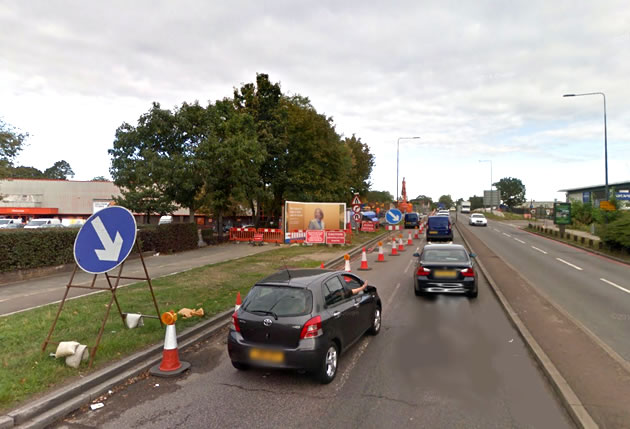North Circular to Be Reduced to One Lane Only Near Chiswick Roundabout
Further restrictions required due to work on the Power Road Bridge
 Gunnersbury Avenue north of Chiswick Roundabout. Picture: Google Street View
Gunnersbury Avenue north of Chiswick Roundabout. Picture: Google Street View
The North Circular near Chiswick Roundabout is going have one lane only in each direction for much of February due to work on the Power Road Bridge. It is expect this will lead to significant extra traffic for the duration of the extra restriction.
The project is already taking much longer than planned with disruptive roadworks expected to continue until the autumn. Northbound traffic is permanently reduced to one lane for this time but between 9pm on 9 February and 5am on 24 February the southbound carriageway will also be one lane only. This is to allow the road to be built on the new western section of the bridge.
On 24 February, the current traffic layout (two lanes southbound and one lane northbound) will be moved across to the new section of bridge ahead of the upcoming works to demolish the eastern section of bridge.
They will be working 24 hours a day during the above dates though they plan to carry out any particularly noisy works during daytime hours. In an attempt to minimise disruption, noise reducing barriers will be used at all times.
Bus route 440 serving Stop D (Power Road) may be affected by increased traffic in the area surrounding Power Road.
Transport for London (TfL) have said that difficult ground conditions in the worksite area mean that they were not able to fully re-open the A406 Gunnersbury Avenue on schedule in December 2017. Before they could begin the bridge demolition, TfL installed a utility bridge to house the pipes and cables which were in the bridge. Heavy lifting equipment was required to lift the new utility bridge into place. However, this was more complicated than expected, and extensive additional supports had to be installed to ensure the lifting equipment was safe. This took a considerable amount of time and delayed both the installation of the utility bridge and the movement of the pipes and cables into this new bridge.
These delays meant TfL were unable to carry out the bridge demolition works as planned. The critical demolition and rebuilding phases for this project can only be completed while the railway below the bridge is closed. A demolition of this type requires a track closure of at least 75 hours. Track closures of over 72 hours are usually only available over bank holidays or the Christmas period, and when there are no other planned works along the railway line. The western section of the bridge was demolished and removed during the August Bank Holiday weekend 2017.
TfL say they have worked closely with Network Rail to secure a new track closure date to carry out the demolition of the remaining eastern of section of the bridge. This is now scheduled to take place over the Easter Bank Holiday weekend 2018.
Until then, they will continue to rebuild the western section of the bridge. This includes preparing the road so traffic can be moved onto the newly constructed section, ahead of the Easter demolition. Final works, including reinstatement of footways and cycle routes across the bridge, are planned for completion by summer 2019.
February 5, 2018